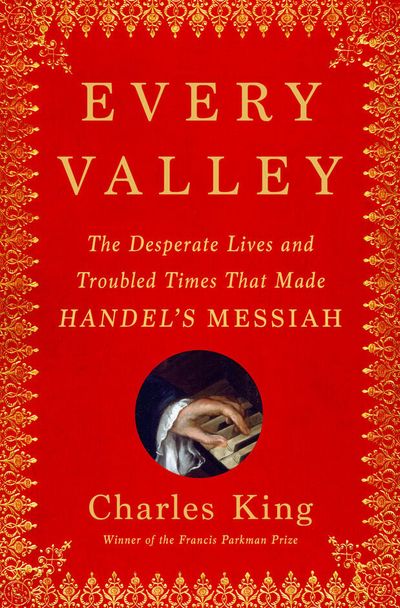The strange, dark history of Handel’s ‘Messiah’; plus, Spokane Symphony’s upcoming performances of the holiday favorite

Handel’s “Messiah” is performed every Christmas season around the world. Originally composed in 1741, the English-language oratorio, almost entirely made up of text from the King James Bible, is as popular today as ever. “Messiah” is performed in churches, community centers and massive concert halls, as well as during group sing-alongs. Its arias are ethereal, its hallelujah chorus magnificent. Its message, that of resurrection, is uplifting and transformative, and all the more ironic because it was funded by the transatlantic slave trade. Writer Charles King reveals this and more in his book “Every Valley: The Desperate Lives and Troubled Times That Made Handel’s Messiah.”
“Wade into the words of the Messiah, and it isn’t hard to find a kind of message in a bottle,” King writes. “A reflection on some of the largest questions of human life, written at a moment – warring, worried, and somehow just wrong – when people could feel the urgency of answering them.” King makes clear that, as in our own time, mid-18th-century England was mired in religious tensions, poverty, war and disease, even as the era eventually became known as the Age of Enlightenment.
George Frideric Handel (1685-1759), ambitious composer that he was, left what’s modern-day Germany for Italy as a young man. There, King writes, he learned a “cantata required instruments and voices. … An opera told a story in song. A sonata was built around a theme developed by an instrumentalist. A concerto addressed multiple themes … shared among cohorts of musicians.” Handel absorbed all this and then departed for England, importing with him the Italian “oratorio, or sacred drama” – a performance that had all the musical wonder of an opera but none of the costumes and sets that made such productions so expensive.
Handel was all about the music. Words were left to others, including librettist Charles Jennens, whose literary contemporaries included Isaac Newton, Daniel Defoe, Alexander Pope, Mary Wollstonecraft and Jonathan Swift. They made up the cultural backdrop of the period.
“People who knew Jonathan Swift also tended to know Handel,” King writes, “and the two men were sometimes described as versions of the same personality: witty to excess, sarcastic, talented at making ordinary things seem strange and new.” “Gulliver’s Travels” had turned Swift into a noted social critic who, as King writes, believed that real enlightenment “came through acknowledging the brokenness of oneself and one’s world … as a first step toward correcting the things you had just identified as lacking.”
This was a noble pursuit, given that the transatlantic slave trade funded almost everything at the time. “Handel, too, circulated in a world where empire, enslavement, and art were mutually dependent. Nearly a third of the Royal Academy of Music’s investors were also investors in the Royal African Company or had close family members who were,” King writes. Newton and John Locke were among the notable men who owned shares in companies responsible for transporting enslaved Africans around the globe. “Slavery was so woven into British politics and society,” King writes, “that its sheer ordinariness could render it invisible.”
Ayuba Diallo was one of the enslaved, kidnapped from his native Senegambia and transported to Annapolis, Maryland, on the ship Arabella. Diallo was himself an enslaver in Africa, as well as an educated Muslim who could read and write. He was still considered property of the Royal African Company, even after he was relocated to London and became indispensable, translating Arabic texts for the royal physician. He was eventually liberated and returned home to Senegambia.
Given his superstar status, Handel could support causes like the one that delivered Diallo from bondage. He knew financiers and benefactors and people at court who could make the money flow. It was a constant effort to keep himself in demand, producing new music that catered to popular tastes, all the while paring down his productions to eliminate the costs for the complex staging that opera entailed.
By 1741, Jennens, the librettist, had partnered with Handel on several productions, but their work “had found only limited success,” according to King. That’s when Jennens turned to the King James Bible for inspiration. In a departure, the libretto had no storyline or characters of note and “only one episode that could be called a scene or incident: the announcement of the birth of a savior to a group of shepherds,” King writes. “His text would amount to something only if (Handel) unleashed his entire talent on it.” Over the course of 24 days, Handel did.
“Messiah” premiered in Dublin to “lift public spirit in the face of failed harvests and bitter cold” in front of 700 people just before Easter in 1742. By the end of one aria, in the oratorio’s wrenching second section, King writes, “it was wholly possible to believe that the greatest heroism was simple survival, that transcendence might even depend on knowing horror from the inside. It was the strangest possible formula for hope but one that, by the final notes, one could begin to see clearly: that the way to overcome one’s enemies was to shock them into witnessing their own cruelty – to force them, like Swift’s Gulliver, to confront their worst, ugliest selves.”
King is the author of several books, including “Gods of the Upper Air: How a Circle of Renegade Anthropologists Reinvented Race, Sex, and Gender in the Twentieth Century.” While at times academic in tone, the book is thoroughly researched and ultimately compelling. King transforms Handel’s world into a place we can all recognize and understand as the foundation for our own.
Lisa Page is co-editor of “We Wear the Mask: 15 True Stories of Passing in America” (Beacon Press). She directs the creative writing program at George Washington University.